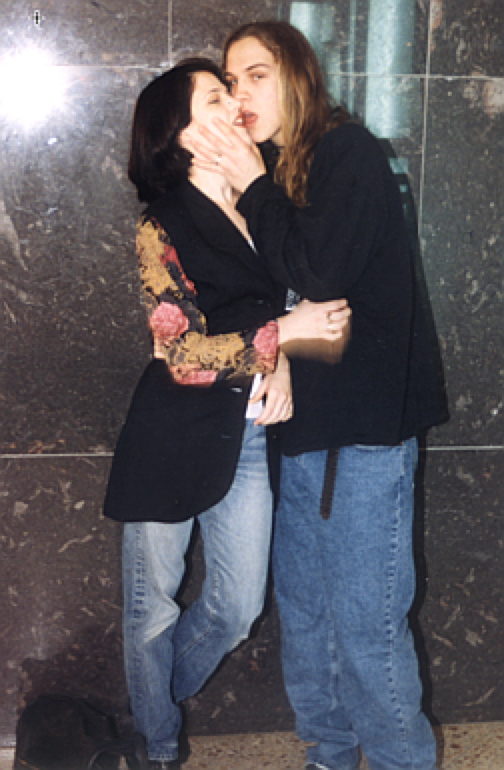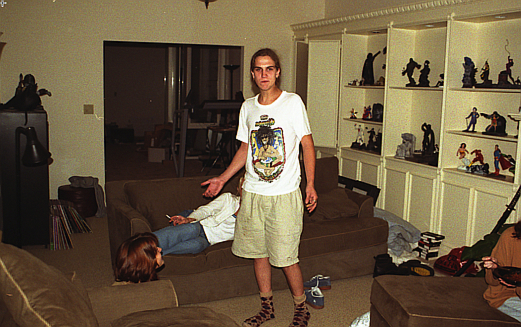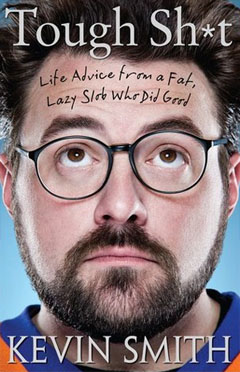
Wednesday 29 March 2006 @ 3:54 pm
The great irony of the “Clerks” theatrical release is that very little attention was given to Jay and Silent Bob in the profile pieces or reviews. Aside from identifying me as the director who also played a small role in the film, the arrival of the two characters – characters I’d not only forever be most closely identified by, but who’d go on to feature prominently in all my subsequent flicks, right up to the who’d've-thunk-it lengths of the pair actually headlining their own movie seven years later – went largely unheralded. To wit, the only notice Jason Mewes received for his performance in “Clerks” while the flick was still in theaters came from a small review in People magazine, in which the author wrote “You want to find the rock he crawled out from under and make sure there’s no more like him under it.” So when I opted to include the stoner duo in “Mallrats” a year later, it wasn’t to capitalize on their insane popularity. For all we knew, there was none. Popping Jay and Silent Bob into “Rats” was simply a matter of sating my desire to put Jason on film again, and solely because he always made me laugh. As far as the studio was concerned, however, I stood alone. The execs at Universal were dead set against giving Jason the part of Jay so much so that they insisted we bring alternate Jay choices to the final round of casting sessions. When both Seth Green and Breckin Myer asked me why they were being considered for the part at all when Jason Mewes was so, as they put it, “genius” in “Clerks”, I told them I was as puzzled as they were. Here was a role that wouldn’t have ever existed without Jason Mewes, and yet Jason Mewes was far from the frontrunner, inasmuch as the studio folks were concerned. Still, Mewes worked his ass off throughout the auditioning process, and when I made the final, big push for him, Universal relented and said I could cast him with the following conditions: 1) Unlike the other cast members, he wouldn’t be flown out to Minnesota on the studio’s dime. Never having made a studio feature before, I assumed this was somewhat normal. Mercifully, so did Mewes. In one of the few turn-of-events that I can ever truly define as Poetic Justice, the same suits who were so down on Jason’s casting as Jay wound up being so over-the-top up with him after his first full week of dailies, that not only were they sending kudos back from L.A., they also began building the marketing plan around his character and the catch-phrase “Snootchie Bootchies.” How Mewes arrived at “Snootchie Bootchies” a nonsensical utterance of which he is the sole author is a fascinating study in linguistics. Whenever Mewes used to say something borderline insulting that might warrant an ass-kicking from the short-fused or the ill-tempered, he would immediately follow it with the exclamation “NEH!” as if to quickly editorialize the objectionable declaration in question and render it null and void. For example “I felched your Mom’s ass last night after I cocked her in the doody-hole” when punctuated with “NEH!” became less inflammatory to the recipient, because the “NEH!” communicated the caveat “I’m kidding. Don’t hit me.” But as with all living things, only evolution would insure its survival over time, and “Neh” soon gave way to “Nootch” as in “I felched your Mom’s ass last night after I cocked her in the doody-hole. NOOTCH!” “Nootch” hung on as long as it could, until it gave way to “Snootch!” “Snootch” later birthed “Snootch to the Nootch” which then begat “Snootchie Nootchies”, which in turn led to the now-legendary-in-some-circles “Mallrats” exclamatory “SNOOTCHIE BOOTCHIES!” There’s nothing quite like watching language grow before your very eyes. An etymologist could have a field day with Mewesian Slang. And Mewes had a field day on “Mallrats”. He very quickly became the most beloved (and most frequently fucked) person on set. About four weeks in on the shoot, Rolling Stone magazine finally gave Jason long-overdue “Clerks” props in an article entitled “Five Minute Oscars”, in which the author listed the best performances in movies that year by people with the least amount of screen time. Mewes’ Jay was among the honorees, and in an expression of cast and crew pride, the piece was hung on the back of the office door for all to see.
It was only at the single best theatrical screening “Mallrats” would ever boast the 1995 San Diego ComiCon screening that we learned how deep an impression Jay and Silent Bob had actually made in “Clerks”. A true art-house release, during the film’s theatrical life, it never played on much more than fifty screens at once which meant reviews in high-brow, big city papers and some national magazines only. And since, with the exception of the aforementioned People blurb, none of those reviews ever singled out Jay and Silent Bob not to mention the fact that the internet hadn’t taken off as it would two years later we all assumed that nobody gave two tin shits about the stoner duo. However, our eyes were opened at that July screening in San Diego when, upon their first appearance on screen, the packed-house erupted in excited recognition so enthusiastically you would’ve thought Yoda had, instead, been standing in front of the pet store in the flick, in CGI form, shredding motherfuckers with dual lightsabers. “Clerks”, by this point, had found its way to home video, and it was in video stores across America where the film had been finally discovered by its true audience: people not much different than the filmmakers themselves. And if this reaction was any indication, said audience LOVED Jay and Silent Bob.
The studio brass in attendance likened the flick’s reception in Diego to the “Animal House” test screening of lore. Dollar signs danced in their eyes, and Mewes was heralded as the Next Big Thing. However, nobody took into consideration that the flick about a comic book geek playing to an audience full of comic book geeks at the world’s largest gathering of comic book geeks was perhaps a weighted exercise in self-selection, and hardly an indicator of how the movie would be embraced in the real world. When “Rats” was released a few months later, it opened to a paltry million and change on 800 screens. By the second weekend, it was out of theaters, damned to the video dustbin (where it, too, would find its eventual audience who’d, thankfully, turn it into a cult classic).
Mewes, meanwhile, had gone off to shoot a flick in Vancouver. Helmed by my friends Malcolm Ingram and Matt Gissing and entitled “Drawing Flies” the flick afforded Jason his first non-Jay role. It also afforded Jason his first taste of heroin courtesy of a girl whose name he doesn’t remember, on a jungle gym in a park lit by the Canadian moon. By this point, Mewes had become something of a partier, keeping a ceiling on his activities that amounted to merely booze and weed. Had I been more educated on the subject of drug addiction and the genetically predisposed, I would’ve known that these were merely gateway drugs: brief stops on the road to something more harsh. Jason’s drug affinity wasn’t a worry in those days; hell, it was regarded as kinda cute. While in mid-”Rats” production, a bunch of us got together to record the commentary track for the “Clerks” laser disc (which would eventually become the original “Clerks” DVD), and on it, Mewes can be heard getting progressively more drunk over the ninety minute duration of the film. This wasn’t a big concern back then; he was just having a good time, I thought. Just because I’d never been a big fan of getting drunk or stoned didn’t mean I had to poo-poo everyone else’s parade. What, Me Worry? Besides, the safeguard was in place already the roadblock we all assumed would keep Jason from ever progressing to harder drugs. Mewes’ Mother, released from jail around early ’95, was diagnosed as HIV Positive – a lifetime of shared needles the presumed culprit. Seeing his Mom drop unhealthy amounts of weight and suffer AIDS-related ailments was, at one point, enough to make Mewes swear off ever even trying heroin. But alas, there was that park in Canada. And nobody ever caught AIDS because they SNORTED heroin, Mewes rationalized. As long as he never shot-up, he’d be okay. By the tail-end of the “Rats” post-production, I’d gotten involved with the actress Joey Adams, and soon, I was spending much more time in Los Angeles than New Jersey. This meant much more time away from Mewes, which in turn meant much more time for Mewes to experiment further with drugs. The high was the lure, and the between-films downtime didn’t help matters much either. Post-”Rats” and “Flies”, having squandered most of his movie money, Jason was forced to go back to work in non-performance roles. Some days, he was a roofer. Some nights, he delivered pizza. When, mid-delivery, someone would ask him “Weren’t you in a movie?” even the level-headed, non-egocentric Mewes would succumb to slight bouts of depression. Movie-making is a rush that’s sometimes followed by a hard come-down. On a set, an actor’s catered too: dressed, fed, and waited on. When all that goes away, and you suddenly find yourself waiting on others (or at least dropping off their pizza and hoping for a two buck tip), even the least big-headed of actors can succumb to a “Where Have All the Good Times Gone?”-case of the blues. So snorting heroin led to snorting coke. And snorting coke led to smoking coke and a one-time dalliance with a crack pipe as well. And I did nothing about it. It was Jason’s life, I figured. He was a big boy now, and he could handle himself. “At least he’d never spike his veins,” I’d say. “Because of his Mom. Of that much, I’m sure.” The next time we worked together was on “Chasing Amy”. Mewes, at this point, was living with his Mother in Keansburg. We’d still hang out when I was in town, and sometimes, he’d come out to L.A. But for the two year period I was involved with Joey, our one-on-one time was pretty limited. “Amy” didn’t change that, as the Jay and Silent Bob scene in the flick was shot over the course of one night at the Marina Diner in Belford. Mewes was on his game that evening, having memorized all of his dialogue, pulling it off without a hitch. As the night wore on, I’d get sluggish, but Mewes would never tire. Coke’ll do that to you. “Amy” came out and put View Askew back on the map in a big way, with stellar reviews and awards to boot. The success of the film paved the way for “Dogma”, a flick I’d written prior to “Clerks” but stuck in drawer for when I had enough cash to pull it off. Thanks to the $12million theatrical gross of the $250,000 “Amy”, we were given $10million to make “Dogma” a film in which Jay and Silent Bob figured more prominently than they ever had in any previous flick. By this point, my relationship with Joey had ended, and I was back in Jersey full time, moving out of my post-”Clerks” condo and into a lush apartment on Broad Street in Red Bank. I started seeing Jason more and more, and together, we took a trip back out to L.A. to empty my stuff out of the apartment I shared with Joey, but primarily, to convince “The X-Files” star Gillian Anderson to play the lead in “Dogma”. Harvey Weinstein, the chairman of Miramax, was co-sponsoring a charity fashion show to benefit AIDS, and he’d invited Scully to sit at his table. Our mission was to convince her that our angels-run-amuck picture was a worthy counterpart to the “Files”. So, in rented tuxes, Mewes and I spent the night wooing the little redhead, blissfully unaware that she’d later read the script and reportedly hate it. Harvey gave us a lift back to the east coast on the Miramax jet. Over the course of the five hour and change flight, the three of us smoked (Harvey’s jet was dubbed “The Flying Ash Tray”) and chit-chatted, with Harvey getting to know Jason better than he’d had time to in the past. When Jason uncharacteristically told Harvey he was really happy with his involvement in the AIDS benefit, due largely to the fact that his Mother was HIV positive herself, the conversation got very serious, with Harvey insisting that he’d get Jason’s Mom to the best doctors in New York City a promise he’d later make good on multiple times over. “We’re not gonna let your Mother die,” the chairman of Miramax told Mewes.
It was around this time that I’d taken over a local comic book store on Monmouth Street that was going out of business and turned it into Jay and Silent Bob’s Secret Stash. Mewes, a longtime comics enthusiast (Deadshot and Vigilante being his favorite characters), asked if he could work at the store full time. Charmed by this notion, I gave him the run of the joint. Months in, when the shop would sometimes open two hours late, or I’d walk in to find a customer hanging out in front of the register, telling me “Jason said he’d be right back. He went to meet someone for a few minutes,” it dawned on me that entrusting Mewes with this much responsibility maybe wasn’t such a hot idea. More than that, it was a massive red flag that something was truly amiss. When we recorded the “Chasing Amy” commentary track for the Criterion laser disc (which, later, became the DVD commentary track as well), Mewes was looking pretty bad. He was nodding out during the record so often, I said to Affleck “I think Mewes might be narcoleptic.” Affleck, a bit more learned on the subject of drugs and addicts, offered “Bro, that ain’t narcolepsy.” The cut scene intros on the “Amy” DVD offer a portrait of Mewes that ain’t pretty: thin, dirty, and barely conscious. At this point, I sat Jason down and said “You’re doing more than snorting heroin from time to time, aren’t you?” After an hour of denial, Mewes finally copped to crossing the boundary he’d so long ago set for himself, upon seeing how HIV-ravaged his Mother had become: he was shooting up. Almost immediately, I moved him out of his Mother’s house in Keansburg and into my Broad Street apartment, where I informed him he was gonna kick the brown, cold turkey. We looked into a methadone clinic in Asbury Park, but Mewes couldn’t start until the following Monday, two days away. After one day of withdrawls, Mewes became so violently ill, he begged for cash for a fix of heroin that would hold him over ’til the next day, when he’d begin the meth program in earnest. He promised he’d get and stay clean, but he needed this last hit to keep him from succumbing to the DT’s. Sweaty, convulsing, anxious and in tears, the boy pleading his case before me was a far cry from the offbeat soul I’d known for nearly a decade; he’d become a full-fledged junkie. Against all better judgment, I agreed to front him the money for the express purpose of scoring heroin, under the condition that he snort it, not shoot it. One phone call and twenty minutes later, and I laid eyes, for the first time, on what would become the bane of my existence: heroin. As Mewes readied it for snorting on my living room table, he chuckled. “What’s so funny?” I asked. It was the only time I’d ever knowingly give Mewes money to buy any kind of drug. Even nine years later, he still refers to it as “That Day You Shook Hands With the Devil, Moves.” For the next five months, Jason and I became inseparable again but this time around, I wasn’t as much his friend as his babysitter. Granted, we’d have good times and enjoy one another’s company; but not letting Mewes out of my sight became an every-waking-moment priority. The hours were organized around keeping Jay preoccupied and busy. Idle hands being the devil’s workshop, constant activity was the order of the day and our days went something like this: 1) Get woken up by Mewes around six a.m., as he was fiending for his methadone fix. And so it went, for nearly half a year. Sometimes, we’d read the “Dogma” script, readying Mewes for his biggest role yet. Sometimes, we’d hang with Bry, Walt or Ed. When the local Toys ‘R Us started drying up for not just 12 inch Greedo dolls, but also 12 inch Hoth Luke on Tauntaun sets, Mewes who’d replaced the addiction to heroin with the addiction to finding 12 inch “Star Wars” dolls for the Stash to re-sell would suggest alternatives. “Moves, we can try Toys ‘R Us’s outside of Monmouth County.”
We’d take long day trips, scouring the land for 12 inch Greedo dolls, bullshitting, laughing, talking about his attitude toward drugs that day. And slowly, as his meth dose lessened, the heroin-induced haze lifted, and the real Mewes began to emerge again. The methadone clinic trips revealed quite a growing heroin problem in Monmouth County, as there was always a long line in front of the place when we pulled up every morning. Mewes would jump in line, and I’d sit in the car listening to Howard Stern. Invariably, someone in the line would look at Mewes, then look at me, then look back at Mewes wide-eyed, apparently thinking “Jesus Jay and Silent Bob have a real problem, man.” Stoners are cute; junkies are sad. And I knew a thing or two about excess myself. By late ’97, my weight had ballooned to 270 pounds. During this time, I, too, took to self-improvement, jumping onto an all-liquid diet program called OptiFast, run out of the local hospital. Inspired by Mewes’ commitment to wrestling the monkey off his back, I battle my demons as well, dropping down to 230 pounds. We were healthier, happier and one of us was hungrier for pussy. Mewes accompanied me to a Duquesne college gig in Pittsburgh, where, post-Q&A, we hit a comic book store called Eide’s. While I was looking for rarities and toys to bring back to the Stash, Mewes was chatting up a girl behind the counter named Stephanie. We were in the store a total of thirty minutes before Mewes pulled me aside. “I like this girl, Moves.” He had me. He knew I wouldn’t leave him alone in Pittsburgh, and he knew I needed a break from spending every waking hour with him as well. Stephanie, he and I both knew, would afford me that break. So Stephanie punched out of work and took the six hour trek back to Red Bank with us, staying at the apartment for a little over a week. During that time, I was able to go to the office, get some “Dogma” pre-pro and script revisions done, and concentrate on things that didn’t have to do with keeping Mewes clean all for the low, low price of letting a total stranger sleep in my apartment. When, a month or so later, we settled on Pittsburgh as the location of the “Dogma” shoot, Mewes was ebullient. He’d taken a shine to Stephanie, so he suddenly couldn’t wait to get started making the flick, mostly so he could hang out with the girl in her home town. But the work had to come first. For months, I’d impressed upon him the importance of learning all of his lines in advance, as this time around, we were gonna have real actors in the flick. “What, like Ben?” Mewes asked. So naturally, I was pretty nervous when Jason and I sat down for our first, Pittsburgh-based, one-on-one “Dogma” rehearsal, and the boy was script-less. “Where’s your fucking script, asshole?” I sighed. So I turned to the first Jay and Silent Bob scene and fed him Bethany’s lines, and without looking at my script, Mewes delivered Jay’s lines in a letter-perfect fashion. “Alright, so you’ve got the first scene down,” I allowed. “Let’s mix it up and try a scene from later in the flick.” So I fed him his lead-in lines from the church exterior scene, and Mewes spits out the Jay responses without hesitation. “You memorized all your lines already?!” I demanded, shocked. I read him Loki’s lines from a Jay-less scene, and amazingly, he responded with Bartleby’s lines. I was dumbfounded, to say the least. “You memorized ALL the lines in the script?!?!” When Mewes wasn’t rehearsing, he was spending every waking moment with Stephanie, either at her apartment or in our shared hotel suite: two rooms adjoining a common living room, so I could keep my eye on the recovering boy. Uber-producer Scott Mosier and I told Jason early on that, for insurance purposes, he’d be subject to random piss tests to scan his urine for traces of dope, as a way to keep him on his toes. Mewes obliged, so we felt we had the situation under control but we wanted a little extra insurance. “We’ve got money in the budget to give you an assistant,” Scott informed me, three weeks before principal photography commenced. This was deemed a good idea, and we brought Stephanie into the office to explain the situation to her: Mewes was a recovering heroin addict, only seven months clean at this point, and we wanted to make sure he stayed clean. So we were opting to pay her three hundred bucks a week to be Jason’s assistant as far as he was concerned, but really, she’d be reporting back to production, alerting us to any suspicious activity, letting us know if he was backsliding into the brown. Stephanie agreed, partly because it meant she could quit her job at Eide’s and be with Jason all the time, and partly, she said, because she cared about the boy and could see we cared about him too. The deal was struck, and Mosier and I felt like baby geniuses. Little did I know that’d be the second time I’d shake hands with the devil as Stephanie became Jay’s Pittsburgh connection for heroin. To Be Continued Comments»The URI to TrackBack this entry is: http://silentbobspeaks.com/wp-trackback.php?p=236 No comments yet. RSS feed for comments on this post. Leave a commentLine and paragraph breaks automatic, e-mail address never displayed, HTML allowed: 
|













